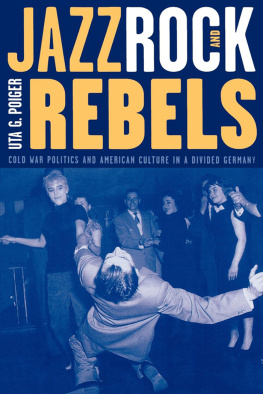Times & Sounds
Germanys Journey from Jazz and Pop
to Krautrock and Beyond
For De
Contents
Foreword
by Hans-Joachim Roedelius
Gladly, I comply with the request of music writer and sociologist Jan Reetze, who for reasons of love emigrated to the U.S. and has worked there for several years now, to contribute a foreword to his book about the specific internal matters within the historic evolution of contemporary German popular music.
As the co-founder of Kluster , Cluster and Harmonia, coincided with my solo career, I think I have contributed some important essentials to the story of this music. The main reputation usually was, and is, assigned to a couple of very special other individuals who have been mentioned over and over again within hundreds of publications (and will surely be mentioned again here), but now, in this book, some of them will be cut out for size while others will be added, which seemed to be bound for eking out an existence as a Sleeping Beauty up to this day.
It is not envy that makes me point this out so distinctly. It is, on the contrary, a delayed gratification about the fact that, in Jans book, several protagonists will finally receive the appreciation theyve long deserved. Several facts that had long been disregarded and never thought about are mentioned here, and the endless story that has been told in countless books is now, finally, conveyed by someone with profound knowledge on the topic.
For experts, as well as newbies, in the Krautrock field, this book does not only open up several new views for the first time, it presents a general overview of the big picture of rock music in Germany. It tells its history and illustrates the roots of the singular and successful musical movement called Krautrock a movement that would not have been possible without its connections to Germanys then political situation, and the little help from a good friend: the influence of the flower power movement that spilled from America over into Germany.
Having said this, Joachim Roedelius wishes you a good read may this book get the attention it deserves.
What's it all about?
When you happen to watch 40-year old TV commercials, they are not only something to smile about, but they will also give you a lot of background information about the time when they were originally shown. If you can read the signs, they will give you an idea about how people were thinking; you can see their wishes and their hopes, sometimes even their sorrows and problems. Its 40 years later now and you realize that in reality most things didnt happen the way they thought it would. In retrospect, we can see how and why.
What goes for TV commercials, goes similarly for music. Germanys daily life and culture mirrors itself in the music Germans listen to. When you read about it, you will learn a lot about Germanys cultural, political, and everyday background as well. These topics are interwoven; they are connected and influence each other. As music everywhere in the world, most German music came about not just under the circumstances Germans lived in, it came about because of the circumstances of certain times, and sometimes it had an influence on those circumstances.
You know the term Krautrock. There is no clear definition, but it refers to German rock music from the late 1960s to the late 1970s. The title of Frumpy s first album, All Will Be Changed (1970), clearly shows the atmosphere of departure this rising Krautrock scene had. Krautrockers, as one of todays several folktales about German rock music goes, followed their ideas in radical consequence. They defied all of the world and its brother, along with their audience and the A&R departments of their record companies (given they were signed), and did what the Lord or his chemical brothers planted into their heads. They were supposed to have done it this way because they were Germans, and Germans, as you know, always stand with one leg in the past and with one leg in the future, but you will never find them in the present.
But on their second album, Frumpy already signaled a note of caution: Take Care of Illusion. In reality, many bands had to walk several twists and turns before they finally found their niche, style and (if they were lucky) audience. Most of them failed or gave up. But to not exactly know ones path is not only something negative, it can also be seen as a chance. Bands fought with their record labels, they were in permanent financial trouble, ripped off by obscure managers. They had to solve technical problems. Band members had to deal with their families, friends, girlfriends, and boyfriends. They had to learn how to cope with sleepy radio hosts and the musical desert on German TV screens. They had to learn how to stand the often discouraging coverage done by the German music press. They had to deal with bizarre tour schedules, clueless concert promoters, agencies, and the employment office. There were also unruly and sometimes aggressive audiences, untrained to listen to new sounds and often unwilling to even pay entrance fees. (Several English and American bands touring Germany had to learn this the hard way, too.) Rock music in Germany was a product of permanent trial and error. To show this, this book will follow artists on their journey through decisions and learning processes.
This book rectifies several things that seem to be common knowledge especially in fan circles; it blows up some cherished illusions. It will give you some background about German music and some of its makers, many of which youve probably never heard of. You will hear about people like Siggi Loch, Peter Meisel, Manfred Weissleder, Mike Leckebusch. There are also names like Conny Plank, Dieter Dierks, Rolf-Ulrich Kaiser, along with some others whose names youve probably heard a thousand times, but not in the way they are portrayed here. You will hear about Bert Kaempfert or James Last, names you probably would never connect to German rock, but the connections exist. You will hear about the working conditions of professional musicians and the jobs they had to do to survive. You will have the chance to go behind the scenes of the studio and record industry. Last but not least, you will hear about the reception of German music in foreign countries and how it sometimes backfired for musicians, producers, and record labels.
This book is not a part of the current pile of retro books, and terms like genius, legend, or icon, et cetera, will rarely be used here. This is a journalistic book, not a scholarly one. Its made for you to read, not for earning me a degree. Its about the stuff I grew up with and the way we (young people in Germany) saw things at a given era. Krautrock is only a part of it, but an important one. My intention is to give you a clue about the circumstances under which different German music styles came into existence, how they influenced each other, and what became of them after their downfall.
Could it be that Krautrock, especially, was a backlash on modernism? Could it be that the chaotic way of developing and making music had its roots deeply in the era of German Romanticism? Could it be that the way Krautrock musicians were thinking was not far from the artists and life movement groups of the Weimar Republic keywords being Worpswede, Hellerau, Monte Verit, et cetera? At least many Krautrock groups, as well as parts of the students movement, had a similar attitude of all or nothing to their predecessors in the 1920s. And it was a similar radicalism that led to phenomena like the 2 June Movement or the Baader Meinhof Group in the 1970s. There are connections, sometimes unpleasant ones, and you will read about them.
Imagine a hot air balloon: Youll get a wide view over the landscape, and from time to time youll fly down to have a closer look at interesting details. When you listen to music from Germany, this book might be a sort of making of. But, to plagiarize Stewart Brand: If youre reading this book just to reinforce your present opinions, youve hired the wrong consultant.







